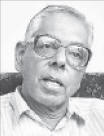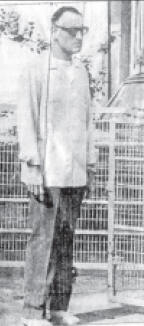A spy and a gentleman
Few saw him and fewer heard him, but Rameshwar Nath Kao’s shadow spread far and
wide.
A tribute
by MK Narayanan
 With
the passing away of Rameshwar Nath Kao (Ramji to his friendship and a legion of
well-wishers) on January 19, 2002 a glorious chapter in the history of Indian
intelligence has ended.
With
the passing away of Rameshwar Nath Kao (Ramji to his friendship and a legion of
well-wishers) on January 19, 2002 a glorious chapter in the history of Indian
intelligence has ended.
For
nearly half a century, Kao straddled the world of intelligence like a colossus,
casting a benign shadow on more than two generations of intelligence officers of
this country. Kao was much more than an icon. He was the very personification of
intelligence, a most worthy successor to the legendary Bhola Nath Mullick who
set the intelligence compass for much of post-independent India.
Indian
intelligence is indeed fortunate that it had two legends within a brief time
span of less than fifty years. The difference between the two could not,
however, have been more striking. One was taciturn, aloof and never wavered in
his determination to see that the Intelligence Bureau of post-Independent India
did not become a Gestapo. Kao, on the other hand, pulsated warmth and was
essentially a father figure to all those who worked with and under him. Both
were, nevertheless, ‘stand-alone visionaries’ and deserve the gratitude of a
nation for their contributions to intelligence and security, which have stood
the country in good stead during its long years of travail.
Kao
had several firsts of his credit. He was the first ‘Hindu officer’ to join the
Intelligence Bureau just prior to independence, when the organisation was still
the captive preserve of the British and a sprinkling of Muslim officers. Another
first for Kao was when he was chosen as Security Adviser to Prime Minister
Nikrumah and the Government of Ghana in the mid-fifties. His responsibilities
included assisting the new nation to set up an intelligence and security
organisation. Pandit Jawahar Lal Nehru, who felt that the newly independent
state of Ghana deserved the best, hand-picked Kao for the assignment.

In
1963 in the aftermath of the Sino-Indian war, when it was decided to set up a
super-secret technical intelligence gathering agency - the Aviation Research
Centre (ARC) - Kao was once again the obvious choice.
Perhaps, Kao would himself agree that his most enduring legacy is the creation
of the Research and Analysis Wing (R&AW). India’s premier external intelligence
agency.
After
the Sino-Indian war of 1962 and the Indo-Pak war of 1965, pressure greatly
mounted for the setting up of a separate external intelligence agency hiving off
the foreign intelligence responsibilities of the Intelligence Bureau to a new
body. Kao’s election as the person to set up and head this new outfit was by no
means automatic given the raging ‘turf battles’ despite the fact that he was
eminently qualified by virtue of his professional ability, standing, reputation,
and skills in the area of the organisation and management of intelligence.
The
choice however proved eminently sensible as the newly constituted R&AW could
draw heavily upon Kao’s knowledge, experience and expertise of foreign
intelligence organisations such as the Secret Intelligence Service of the United
Kingdom, the Central Intelligence Agency of the
United States,
and West Germany’s BND.
Kao’s
finest hour, and that of the R&AW probably came in 1971. This was the period
when East Pakistan was being torn apart under the jackboots of Yahya Khan’s
storm-troopers and the birth pangs of
Bangladesh
under Mujibur Rehman were beginning. To this day, Kao’s role remains hidden from
the public, and the achievements owed a great deal to the ‘behind the scenes’
work of Kao and his band of operatives. When an unvarnished history is written
of the birth of Bangladesh, and credit for India’s role as a facilitator is
acknowledged, hopefully then the stellar contribution of Kao and others who
assisted him will see the light. This ‘purple patch’ in the history of
intelligence success must not remain hidden for ever.
Few
intelligence officers in a democratic set up have been so privileged as to have
the kind of relationship that Kao had with Indira Gandhi. Gandhi’s reliance on
Kao for most matters concerning intelligence and security was almost total and
his advice was inevitably sound and often heeded. On occasions, even though he
was the head of the R&AW, Gandhi depended on Kao’s advice concerning the
internal problems of the country. Canards were a plenty during this period,
including one that Kao was among those who had advised Gandhi to promulgate the
Emergency - a lie which has since been nailed.
Kao’s
relationship with Gandhi dates back many years, to the period when Kao as a
deputy director in the Intelligence Bureau in charge of VIP security was
responsible for the security and protection of Nehru. She had the occasion then
to see Kao’s intelligence skills at close quarters, specially his meticulous
attention to detail, his ability to be firm without ruffling feathers and in
managing her father who usually tended to complain that security came between
him and the people. She also came to appreciate his fine sensitive mind and
transparent honesty and sincerity. This, perhaps more than anything else, apart
from his diplomatic and management skills, apparently led to his being chosen on
the head of the new external intelligence outfit.
When
the Janata Government under Morarji Desai took office in 1977, Kao went into
retirement, only to be resurrected as Senior Advisor in 1980 after Gandhi came
back to power. The years 1980-84 saw him operating below the radar-screen, but
he carried out several invaluable tasks, some in close association with Arun
Singh and later, after Rajiv Gandhi came into political prominence, with the
latter.
The
setting up of the National Security Guard was one, which has since proved
invaluable in dealing with hijackings and terrorist actions (including Black
Thunder in 1988). A little-know secret is Kao’s visit to China in 1984 laying
the ground work for the subsequent ‘historic visit’ of Rajiv Gandhi to China in
1988. For much of this period, Kao continued to function as the ‘eminence grise’
of the security establishment.
After
Gandhi’s unfortunate assassination, Kao gradually withdrew from active
involvement in intelligence and security matters. As Prime Minister, Rajiv
Gandhi, however, often consulted him. Other prime ministers used various
interlocutors to seek his advice.
Ramji
Kao as a veritable giant - a gentle giant at that. For most of us who spent a
lifetime in security and intelligence, he was the ideal and our inspiration.
With his passing away, the age of civility in intelligence will in all
likelihood come to an end. Many of us will be tempted to ask ‘will there be
another like him?’
